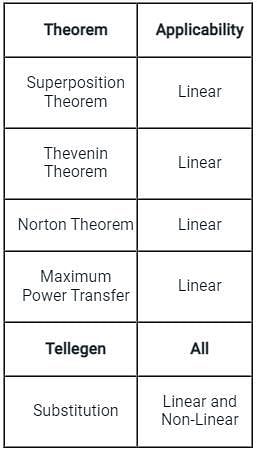Electrical Engineering (EE) Exam > Electrical Engineering (EE) Questions > Which of the following theorem can be applied...
Start Learning for Free
Which of the following theorem can be applied to any network-linear or non-linear, active or passive, time-variant or time-invariant?
- a)Thevenin Theorem
- b)Norton Theorem
- c)Superposition Theorem
- d)Tellegen’s Theorem
Correct answer is option 'D'. Can you explain this answer?
| FREE This question is part of | Download PDF Attempt this Test |
Most Upvoted Answer
Which of the following theorem can be applied to any network-linear or...
The Superposition Theorem can be applied to any network-linear or non-linear, active or passive, time-variant or time-invariant.
Free Test
FREE
| Start Free Test |
Community Answer
Which of the following theorem can be applied to any network-linear or...
Tellegen’s Theorem:
Tellegen’s Theorem states that the summation of power delivered is zero for each branch of any electrical network at any instant of time.
Mathematically, for any linear, non-linear, passive, active, time-variant, or time-invariant network this is defined as:

n = number of branches
vk = voltage across the kth element
ik = current in the kth branch
Important Notes:
Various Theorem and the circuits where they are applicable is shown below in the table:

Mathematically, for any linear, non-linear, passive, active, time-variant, or time-invariant network this is defined as:

n = number of branches
vk = voltage across the kth element
ik = current in the kth branch
Important Notes:
Various Theorem and the circuits where they are applicable is shown below in the table:

Attention Electrical Engineering (EE) Students!
To make sure you are not studying endlessly, EduRev has designed Electrical Engineering (EE) study material, with Structured Courses, Videos, & Test Series. Plus get personalized analysis, doubt solving and improvement plans to achieve a great score in Electrical Engineering (EE).

|
Explore Courses for Electrical Engineering (EE) exam
|

|
Similar Electrical Engineering (EE) Doubts
Which of the following theorem can be applied to any network-linear or non-linear, active or passive, time-variant or time-invariant?a)Thevenin Theoremb)Norton Theoremc)Superposition Theoremd)Tellegen’s TheoremCorrect answer is option 'D'. Can you explain this answer?
Question Description
Which of the following theorem can be applied to any network-linear or non-linear, active or passive, time-variant or time-invariant?a)Thevenin Theoremb)Norton Theoremc)Superposition Theoremd)Tellegen’s TheoremCorrect answer is option 'D'. Can you explain this answer? for Electrical Engineering (EE) 2024 is part of Electrical Engineering (EE) preparation. The Question and answers have been prepared according to the Electrical Engineering (EE) exam syllabus. Information about Which of the following theorem can be applied to any network-linear or non-linear, active or passive, time-variant or time-invariant?a)Thevenin Theoremb)Norton Theoremc)Superposition Theoremd)Tellegen’s TheoremCorrect answer is option 'D'. Can you explain this answer? covers all topics & solutions for Electrical Engineering (EE) 2024 Exam. Find important definitions, questions, meanings, examples, exercises and tests below for Which of the following theorem can be applied to any network-linear or non-linear, active or passive, time-variant or time-invariant?a)Thevenin Theoremb)Norton Theoremc)Superposition Theoremd)Tellegen’s TheoremCorrect answer is option 'D'. Can you explain this answer?.
Which of the following theorem can be applied to any network-linear or non-linear, active or passive, time-variant or time-invariant?a)Thevenin Theoremb)Norton Theoremc)Superposition Theoremd)Tellegen’s TheoremCorrect answer is option 'D'. Can you explain this answer? for Electrical Engineering (EE) 2024 is part of Electrical Engineering (EE) preparation. The Question and answers have been prepared according to the Electrical Engineering (EE) exam syllabus. Information about Which of the following theorem can be applied to any network-linear or non-linear, active or passive, time-variant or time-invariant?a)Thevenin Theoremb)Norton Theoremc)Superposition Theoremd)Tellegen’s TheoremCorrect answer is option 'D'. Can you explain this answer? covers all topics & solutions for Electrical Engineering (EE) 2024 Exam. Find important definitions, questions, meanings, examples, exercises and tests below for Which of the following theorem can be applied to any network-linear or non-linear, active or passive, time-variant or time-invariant?a)Thevenin Theoremb)Norton Theoremc)Superposition Theoremd)Tellegen’s TheoremCorrect answer is option 'D'. Can you explain this answer?.
Solutions for Which of the following theorem can be applied to any network-linear or non-linear, active or passive, time-variant or time-invariant?a)Thevenin Theoremb)Norton Theoremc)Superposition Theoremd)Tellegen’s TheoremCorrect answer is option 'D'. Can you explain this answer? in English & in Hindi are available as part of our courses for Electrical Engineering (EE).
Download more important topics, notes, lectures and mock test series for Electrical Engineering (EE) Exam by signing up for free.
Here you can find the meaning of Which of the following theorem can be applied to any network-linear or non-linear, active or passive, time-variant or time-invariant?a)Thevenin Theoremb)Norton Theoremc)Superposition Theoremd)Tellegen’s TheoremCorrect answer is option 'D'. Can you explain this answer? defined & explained in the simplest way possible. Besides giving the explanation of
Which of the following theorem can be applied to any network-linear or non-linear, active or passive, time-variant or time-invariant?a)Thevenin Theoremb)Norton Theoremc)Superposition Theoremd)Tellegen’s TheoremCorrect answer is option 'D'. Can you explain this answer?, a detailed solution for Which of the following theorem can be applied to any network-linear or non-linear, active or passive, time-variant or time-invariant?a)Thevenin Theoremb)Norton Theoremc)Superposition Theoremd)Tellegen’s TheoremCorrect answer is option 'D'. Can you explain this answer? has been provided alongside types of Which of the following theorem can be applied to any network-linear or non-linear, active or passive, time-variant or time-invariant?a)Thevenin Theoremb)Norton Theoremc)Superposition Theoremd)Tellegen’s TheoremCorrect answer is option 'D'. Can you explain this answer? theory, EduRev gives you an
ample number of questions to practice Which of the following theorem can be applied to any network-linear or non-linear, active or passive, time-variant or time-invariant?a)Thevenin Theoremb)Norton Theoremc)Superposition Theoremd)Tellegen’s TheoremCorrect answer is option 'D'. Can you explain this answer? tests, examples and also practice Electrical Engineering (EE) tests.

|
Explore Courses for Electrical Engineering (EE) exam
|

|
Suggested Free Tests
Signup for Free!
Signup to see your scores go up within 7 days! Learn & Practice with 1000+ FREE Notes, Videos & Tests.
























